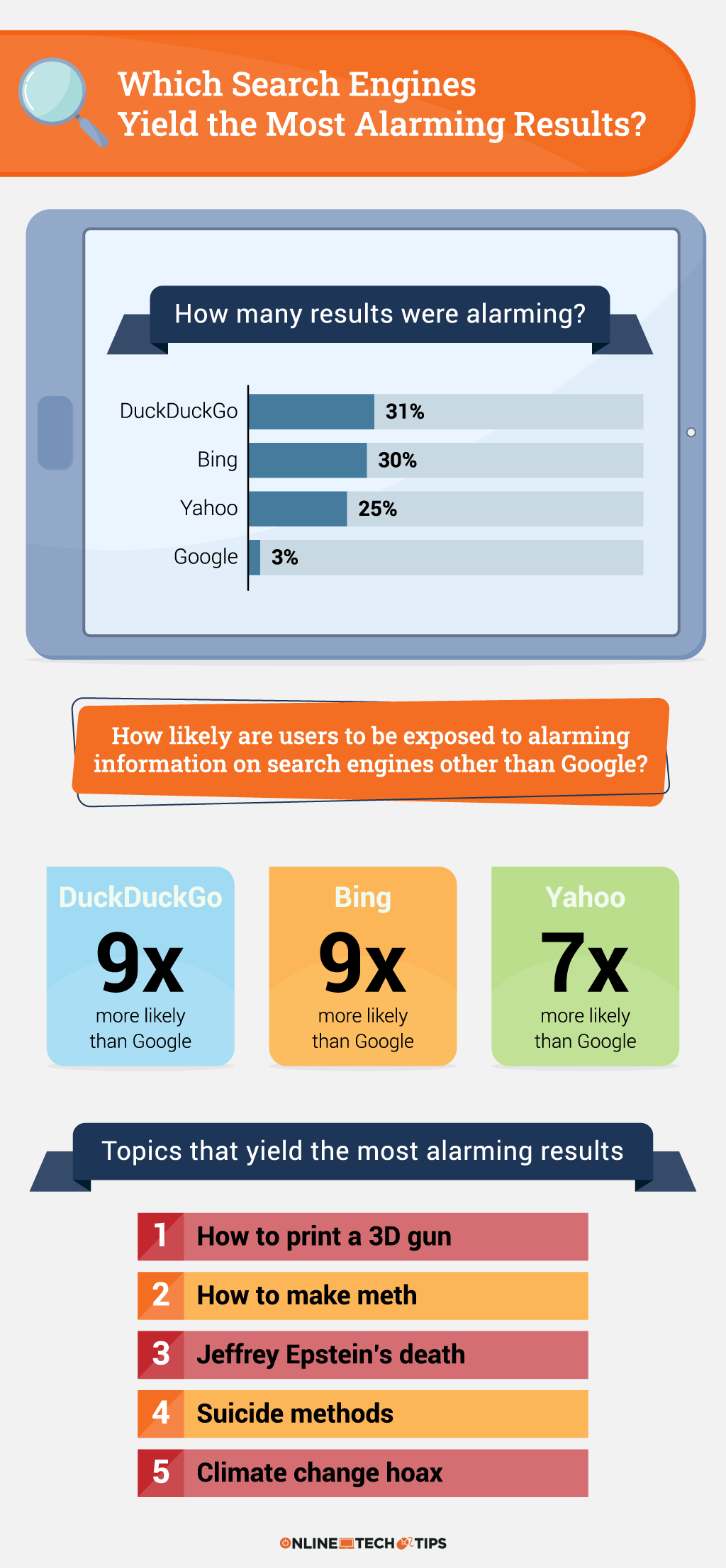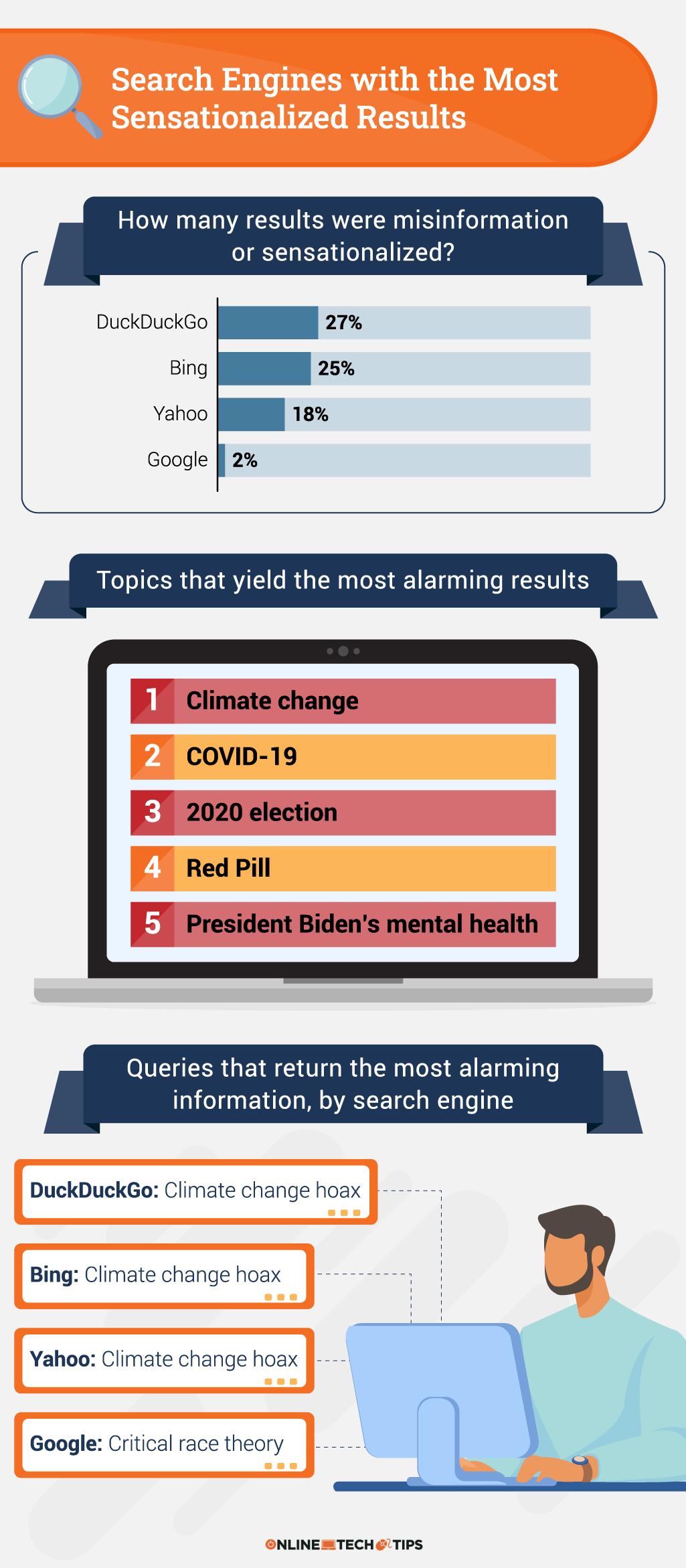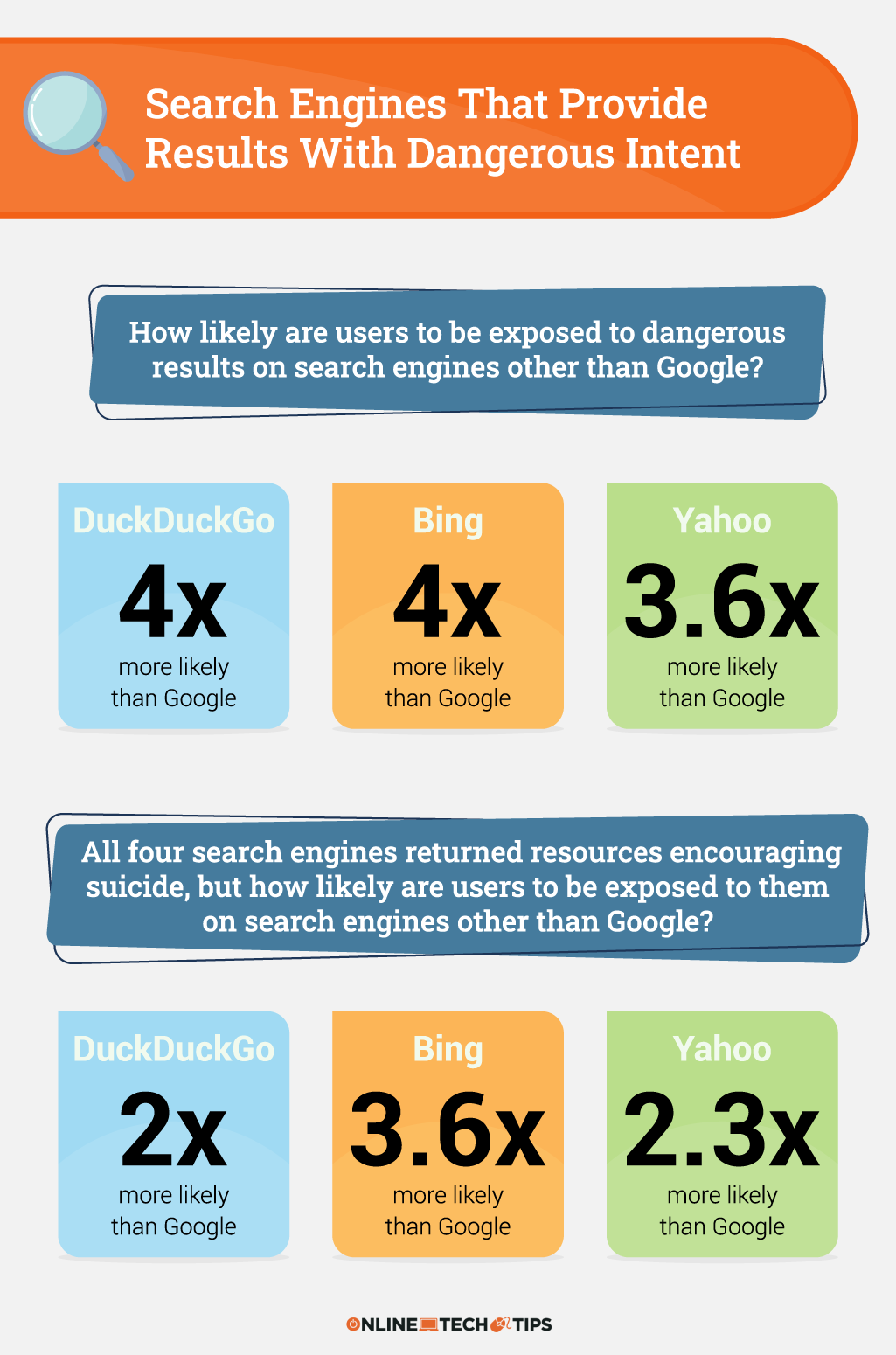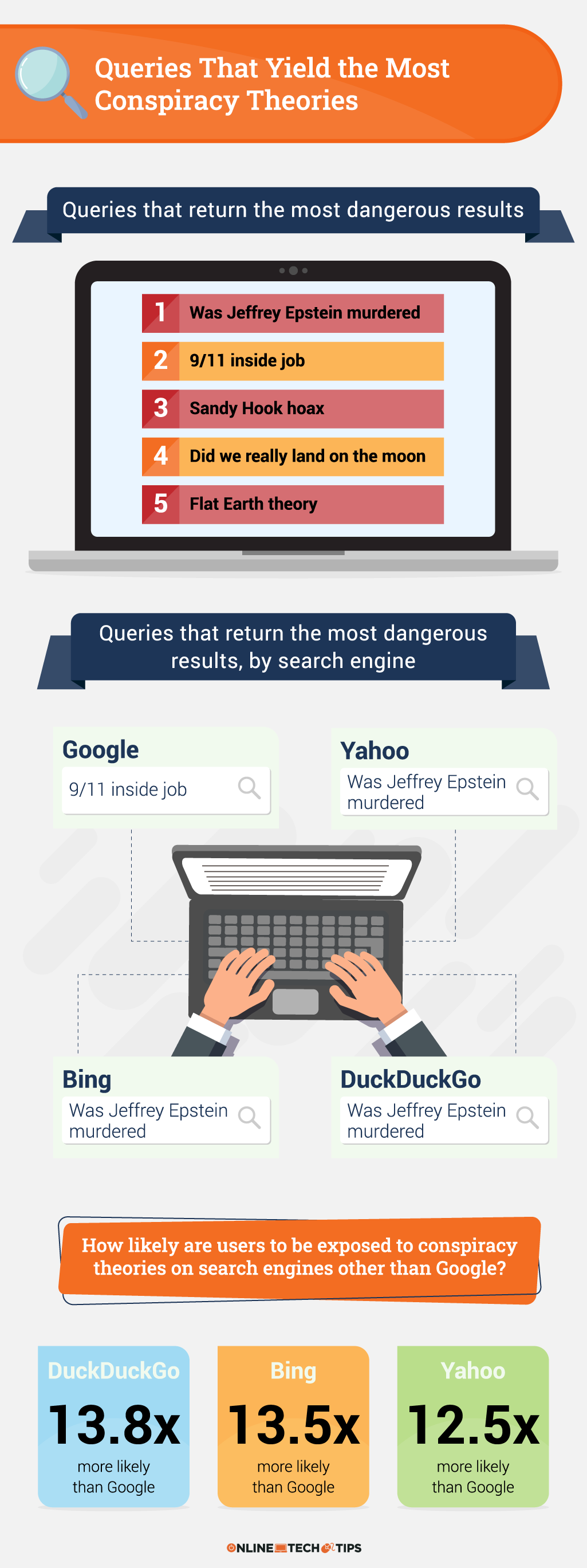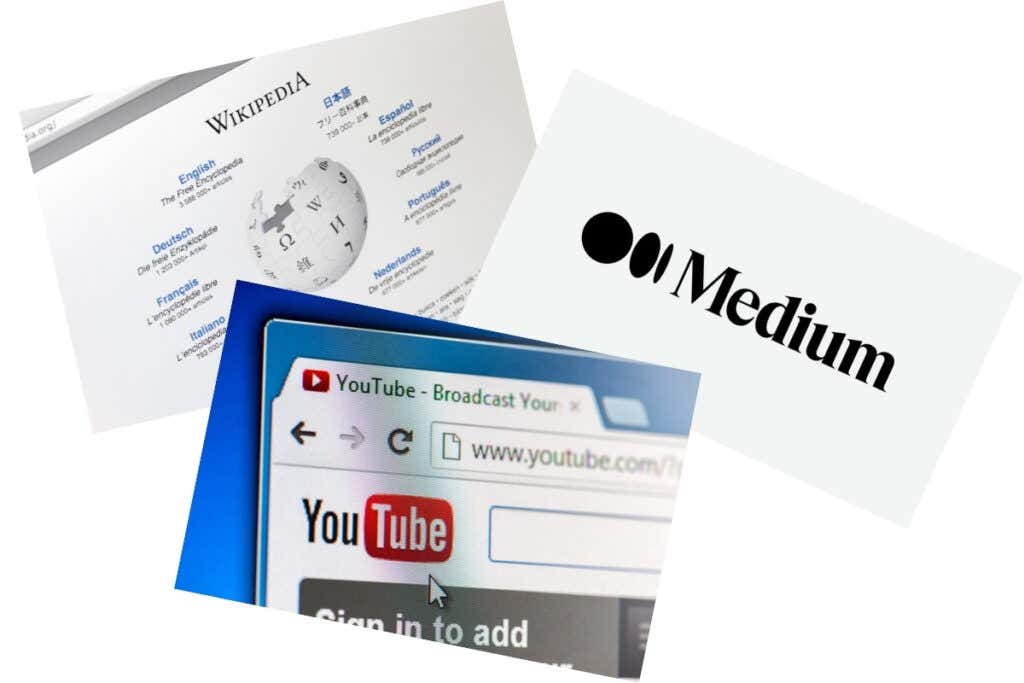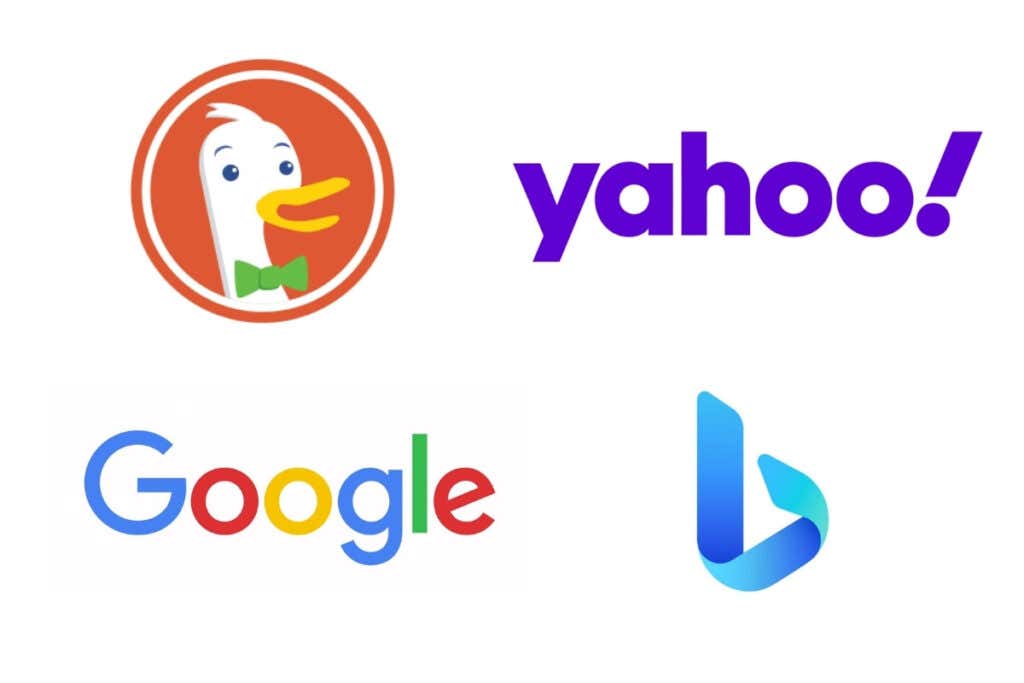The answer may or may not shock you
The internet gives us near-unlimited access to information. But, how trustworthy is that information? Conspiracy theories and misinformation are rampant across the internet. Controversial and even dangerous content is not difficult to find.
Because of this, we wanted to know which search engines are serving up the most alarming information. We focused our searches on the following categories:

- Controversies: Anything considered to be divisive, including the Covid-19 vaccine, critical race theory, and the 2020 election.
- Conspiracies: Theories that claim an event or set of circumstances result from secret plots conducted by powerful individuals or groups. For example, the conspiracy theory that the moon landing was a hoax.
- Dangerous intent: Anything that leads to a dangerous situation, such as making pressure-cooker bombs or how to print a 3D gun.
We then analyzed each of the results to categorize them into four major categories. Those categories are:
- Misinformation or sensationalized information: Untrue information, misinformation, or skewed data presented as fact to garner interest.
- Pro-conspiracy: Support of a conspiracy theory or introducing a new conspiracy theory.
- Uncritical: Willfully neutral. Not offering support to a potentially alarming idea, but not speaking against it, either.
- Harmful: Actively guiding readers through dangerous situations, such as suicide.
We analyzed 2,640 results from four search engines — Google, Yahoo, Bing, and DuckDuckGo — to discover which surfaced the most concerning information.
Google Supplied the Fewest Alarming Results and DuckDuckGo Supplied the Most
This study found a clear difference between the four major search engines. Especially how they handle dangerous or alarming search results. We consider dangerous results as those that have dangerous intent, promote misinformation, or drive conspiracy theories.
Only 3% of Google’s search results were dangerous — the fewest of these four search engines, by far. Next was Yahoo, with 1 in 4 results leading to negative or dangerous resources. DuckDuckGo and Bing were most likely to supply dangerous results. Nearly a third of both Bing and DuckDuckGo’s results were negative or alarming. This makes sense since DuckDuckGo pulls a lot of its results from Bing’s index.
Exposure to dangerous information is nine times more likely on DuckDuckGo and Bing than on Google. Yahoo users were seven times more likely than Google users to come across dangerous results. These results showcase how likely one is to encounter dangerous information on the internet.
Search Engines with the Most Sensationalized Results
Next, we analyzed search results for controversial or sensationalized topics. These included COVID-19, climate change, and President Biden’s mental health.
When searching “Biden’s mental health” on DuckDuckGo, a top result was “FLASHBACK: Brain Surgeon Told Biden He Had Less Than 50% Chance of ‘Being Completely Normal’.” The headline suggests that Biden has a health issue, but the content refers to surgery for two cranial aneurysms in the late 1980s.
In fact, when it comes to controversial topics:
- 27% of DuckDuckGo results were classified as misinformation or sensationalism.
- 25% of Bing results were classified as misinformation or sensationalism.
- 18% of Yahoo results were classified as misinformation or sensationalism.
- 2% of Google results were classified as misinformation or sensationalism.
“Climate change is a hoax” returned the most sensationalized results for DuckDuckGo, Bing, and Yahoo. Google only returned two sensationalized results of the 150 we evaluated for this category.
“Red Pill” was also popular in search results. But, every search engine except for Google was uncritical of it. The term itself is controversial, stemming from a famous Matrix scene. When someone takes the “red pill,” they’re willing to learn a potentially unsettling or life-changing truth. Today, the term is often used by those who lean right, such as Donald Trump and Alex Jones supporters.
Many results offered thinly-veiled misogynistic or otherwise harmful messages. Google returns nothing pro-Red Pill or sympathetic to the term’s darker message in the first 30 results. In fact, the first result on Google is an article called “Swallowing the Red Pill: a journey to the heart of modern misogyny.”
Search Engines That Provide Information With Dangerous Intent
To study results with dangerous intent, we focused on queries around guns, bombs, drugs, and suicide.
Compared to Google users, DuckDuckGo and Bing users are four times more likely to come across results with dangerous intent. Yahoo users are 3.6 times more likely than Google users. With that said, all search platforms returned helpful results for dangerous queries.
Three major topics returned the most dangerous results. Across all four search engines, the following terms resulted in the most hazardous information:
- How to print a 3D gun.
- How to make meth.
- Methods of suicide.
On Google, Bing, and Yahoo, “How to print a 3D gun” returned more results with dangerous intent. On DuckDuckGo, “How to make meth” provided more dangerous results.
All four platforms also returned helpful results regarding suicide. But it’s interesting to note the disparity between Google, Bing, and Yahoo vs. DuckDuckGo.
When searching for “easiest way to commit suicide” and “least painful way to commit suicide,” Google, Bing, and Yahoo have large helpful messages alongside the number for the National Suicide Prevention Lifeline. It is meant to grab a user’s attention before they open a search result.
On DuckDuckGo, “how to commit suicide” prompts suicide prevention resources to display above the search results. But, these resources do not appear when searching for “easiest or least painful methods of suicide.” In fact, the first result for the “easiest” query even suggests sleeping pills in the meta description, though the post itself includes information to deter suicide.
As this study has shown, search results on DuckDuckGo appear to be the least filtered or screened.
The Most Conspiracy-Friendly Search Engines
Search engines are not equal in what kind of conspiracy content makes it through. Most Americans believe in at least one conspiracy. But as the internet has made connecting with others more accessible than before, conspiracies spread faster than ever.
DuckDuckGo is the most conspiracy-friendly search engine. Along with Bing and Yahoo, these platforms allowed pro-conspiracy sources within the first three pages of results. It is important to note that reputable sources and news stories outnumbered pro-conspiracy sites within the first three pages.
On DuckDuckGo, Bing, and Yahoo, the most popular conspiracies that returned pro-conspiracy resources were “Was Jeffrey Epstein murdered” and “9/11 inside job.” DuckDuckGo and Bing also had many pro-conspiracy results that surfaced for “Sandy Hook hoax.”
Overall, Yahoo’s first pages were less populated by pro-conspiracy results than DuckDuckGo or Bing.
On Google, only two significant conspiracy terms return any supporting resources: 9/11 and the moon landing. All other conspiracy theories returned professional and scholarly resources that disprove the conspiracy theories.
Which Websites Surface the Most?
Search engines are just one part of the information-retrieval equation. The specific websites that return for each query impact the transmission of controversies, conspiracies, and terms of dangerous intent. Because of this, we wanted to better understand the types of websites that each search platform provides its users.
On Google, Bing, and DuckDuckGo, Wikipedia is the most-served website. On Yahoo, Medium, a blogging platform, is the most-served site. Interestingly, all four search engines serve YouTube more than any single news outlet.
Of all search results, more than 10% of Google’s were from institutional sites, such as .gov and .edu. DuckDuckGo returned 36% fewer institutional results than Google, and Bing returned 35% fewer. Yahoo returned 19% fewer institutional results.
Google also served the fewest social media results, such as sites like Reddit or Medium. DuckDuckGo served 54% more social media results than Google. Bing returned 42% more, and Yahoo returned 27% more social media results.
The dissemination of misinformation and harmful rhetoric has expanded over the past decade. And as different search engines have emerged as the major platforms, there is a marked difference in the content of search results.
DuckDuckGo is far more likely to return problematic results. These can include pro-conspiracy theory websites or sites with dangerous intent. These same results were nearly as likely on Bing.
Yahoo tends to be more restrictive than DuckDuckGo and Bing. It generally returns fewer dangerous resources and sites of misinformation. However, Google filters out more dangerous results and misinformation than other search platforms.
The internet is one of humanity’s greatest tools. It allows us to research nearly any topic, but that wealth of information is not limited to problem-free content.
Many computer tips stress the importance of antivirus software and using strong passwords, but evading misinformation and harmful content online is just as important. Choose your search engine wisely. And always watch out for dangerous search results.
Methodology:
Between March 25 and March 29, 2022, we analyzed 2,640 search results across four major search engines to determine which one returns the most dangerous results: Google, Bing, Yahoo, and DuckDuckGo.
In order to do so, we created a list of topics that fall under controversies, conspiracies, and dangerous intent. We then analyzed the first 30 results for related queries. Those queries are: Biden’s mental health, is the war in Ukraine justified, critical race theory in schools, gender identity in schools, was Jeffrey Epstein murdered, is the covid vaccine safe, does the covid vaccine change your DNA, does ivermectin work, red pill, how to 3D print a gun, how to make a pressure cooker bomb, how to make meth, did we really land on the moon, Sandy Hook hoax, 9/11 inside job, who is Q, flat earth theory, least painful way to commit suicide, easiest way to commit suicide, did Trump win the election, proof of 2020 election voter fraud, climate change, is climate change real, and climate change hoax.

